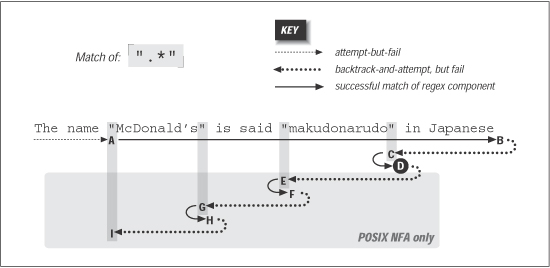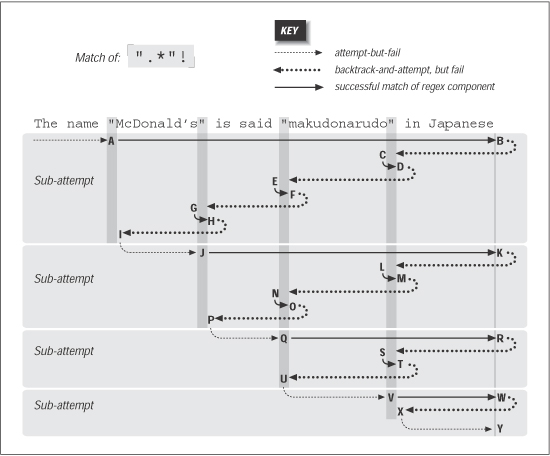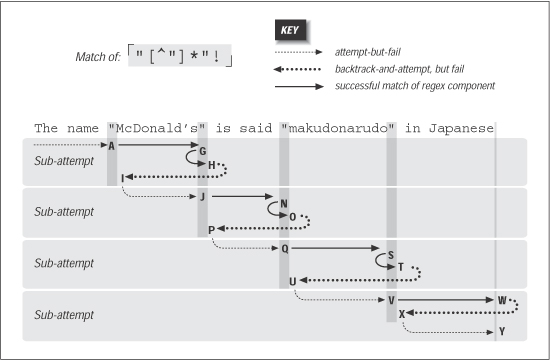6.2 A Global View of Backtracking
On a local level, backtracking is simply the return to attempt an untried option.
That's simple enough to understand, but the global implications of backtracking
are not as easily grasped. In this section, we'll take an explicit look at the details
of backtracking, both during a match and during a non-match, and we'll try to
make some sense out of the patterns we see emerge.
Let's start by looking closely at some examples from the previous chapters. From
Section 4.5.2, if we apply
 ".*" ".*" to
to
The name "McDonald's" is said "makudonarudo" in Japanese
we can visualize the matching action as shown in Figure 6-3.
The regex is attempted starting at each string position in turn, but because the
initial quote fails immediately, nothing interesting happens until the attempt starting
at the location marked A. At this point, the rest of the expression is attempted,
but the transmission (see Section 4.2.2) knows that if the attempt turns out to be a dead end,
the full regex can still be tried at the next position.
The
 .* .* then matches to the end of the string, where the dot is unable to match
the nothingness at the end of the string and so the star finally stops. None of the
46 characters matched by
then matches to the end of the string, where the dot is unable to match
the nothingness at the end of the string and so the star finally stops. None of the
46 characters matched by
 .* .* is required, so while matching them, the engine
accumulated 46 more situations to where it can backtrack if it turns out that it
matched too much. Now that
is required, so while matching them, the engine
accumulated 46 more situations to where it can backtrack if it turns out that it
matched too much. Now that
 .* .* has stopped, the engine backtracks to the last of
those saved states, the " try
has stopped, the engine backtracks to the last of
those saved states, the " try
 ".* ".* " " at ···anese
at ···anese " state.
" state.
This means that we try to match the closing quote at the end of the string. Well, a
quote can match nothingness no better than dot, so this fails too. The engine
backtracks again, this time trying to match the closing quote at ···Japanes e, which
also fails. e, which
also fails.

The remembered states accumulated while matching from A to B are tried in
reverse (latest first) order as we move from B to C. After trying only about a dozen
of them, the state that represents " try
 ".* ".* " " at ···arudo
at ···arudo
 "•in•Japa···
" is reached,
point C. This can match, bringing us to D and an overall match: "•in•Japa···
" is reached,
point C. This can match, bringing us to D and an overall match:
The name "McDonald's" is said "makudonarudo" in Japanese
If this is a Traditional NFA, the remaining unused states are simply discarded and
the successful match is reported.
6.2.1 More Work for a POSIX NFA
For POSIX NFA, the match noted earlier is remembered as "the longest match we've
seen so far," but all remaining states must still be explored to see whether they
could come up with a longer match. We know this won't happen in this case, but
the regex engine must find that out for itself.
So, the states are tried and immediately discarded except for the remaining two situations
where there is a quote in the string available to match the final quote.
Thus, the sequences D-E-F and F-G-H are similar to B-C-D, except the matches at
F and H are discarded as being shorter than a previously found match at D
By I, the only remaining backtrack is the "bump along and retry" one. However,
since the attempt starting at A
was able to find a match (three in fact), the POSIX
NFA engine is finally done and the match at D is reported.
6.2.2 Work Required During a Non-Match
We still need to look at what happens when there is no match. Let's look at
 ".*"! ".*"!
 . We know this won't match our example text, but it comes close on a number
of occasions throughout the match attempt. As we'll see, that results in much
more work.
. We know this won't match our example text, but it comes close on a number
of occasions throughout the match attempt. As we'll see, that results in much
more work.
Figure 6-4 illustrates this work. The A-I sequence looks similar to that in Figure 6-3. One difference is that this time it does not match at point D (because the ending
exclamation point can't match). Another difference is that the entire sequence
in Figure 6-4 applies to both Traditional and POSIX NFA engines: finding no match,
the Traditional NFA must try as many possibilities as the POSIX NFAŚ all of them.

Since there is no match from the overall attempt starting at A and ending at I, the
transmission bumps along to retry the match. Attempts eventually starting at points
J, Q, and V look promising, but fail similarly to the attempt at A. Finally at Y, there
are no more positions for the transmission to try from, so the overall attempt fails.
As Figure 6-4 shows, it took a fair amount of work to find this out.
6.2.3 Being More Specific
As a comparison, let's replace the dot with
 [^"] [^"] . As discussed in the previous
chapter, this gives less surprising results because it is more specific, and the end
result is that with it, the new regex is more efficient to boot. With
. As discussed in the previous
chapter, this gives less surprising results because it is more specific, and the end
result is that with it, the new regex is more efficient to boot. With
 "[^"
]*"! "[^"
]*"! , the
, the
 [^"]* [^"]* can't get past the closing quote, eliminating much matching and subsequent
backtracking.
can't get past the closing quote, eliminating much matching and subsequent
backtracking.
Figure 6-5 shows the failing attempt (compare to Figure 6-4). As you can see,
much less backtracking is needed. If the different results suit your needs, the
reduced backtracking is a welcome side effect.

6.2.4 Alternation Can Be Expensive
Alternation can be a leading cause of backtracking. As a simple example, let's use
our makudonarudo test string to compare how
 u|v|w|x|y|z u|v|w|x|y|z and
and  [uvwxyz] [uvwxyz] go
about matching. A character class is usually a simple test,
so
go
about matching. A character class is usually a simple test,
so
 [uvwxyz] [uvwxyz] suffers
only the bump-along backtracks (34 of them) until we match at:
suffers
only the bump-along backtracks (34 of them) until we match at:
The name "McDonald's" is said "makudonarudo" in Japanese
With
 u|v|w|x|y|z u|v|w|x|y|z , however, six backtracks are required at each starting position,
eventually totaling 204 before we achieve the same match. Obviously, not every
alternation is replaceable, and even when it is, it's not necessarily as easily as with
this example. In some situations, however, certain techniques that we'll look at
later can greatly reduce the amount of alternation-related backtracking required for
a match.
, however, six backtracks are required at each starting position,
eventually totaling 204 before we achieve the same match. Obviously, not every
alternation is replaceable, and even when it is, it's not necessarily as easily as with
this example. In some situations, however, certain techniques that we'll look at
later can greatly reduce the amount of alternation-related backtracking required for
a match.
Understanding backtracking is perhaps the most important facet of NFA efficiency,
but it's still only part of the equation. A regex engine's optimizations can greatly
improve efficiency. Later in this chapter, we'll look in detail at what a regex engine
needs to do, and how it can optimize its performance.
|